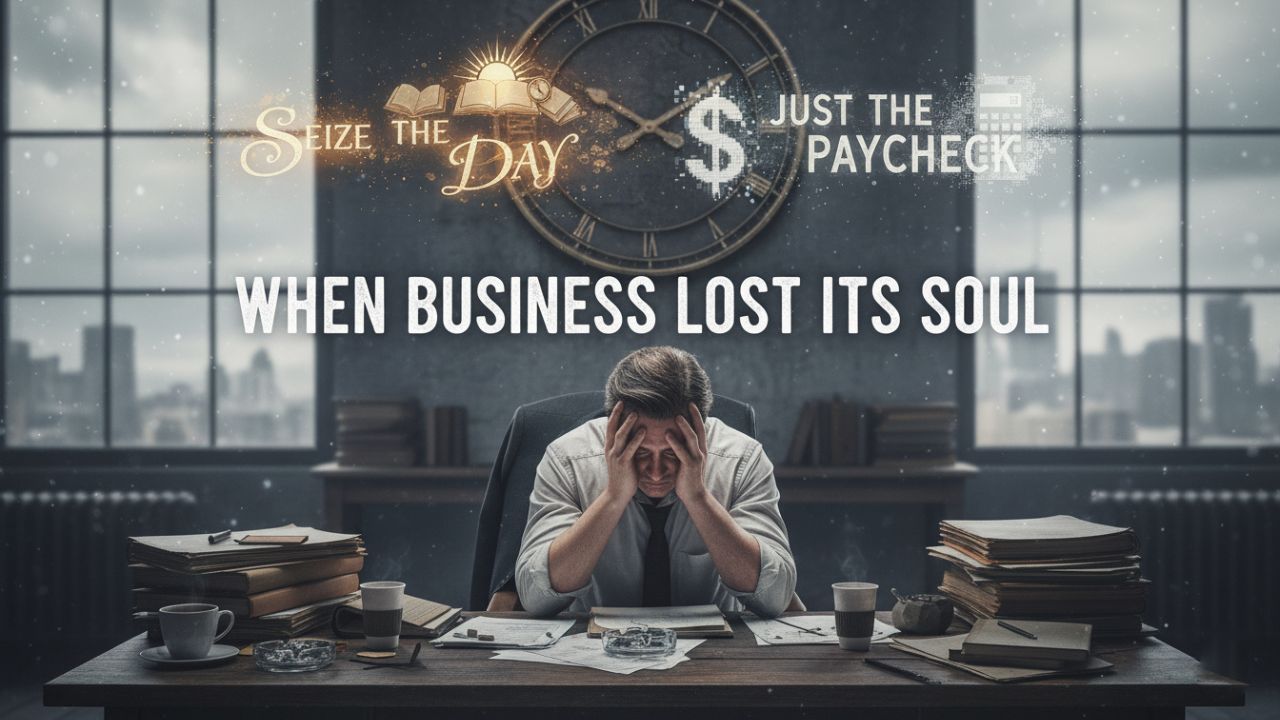Seize the Day (But Not Just the Paycheck)
There’s a moment in every generation when something fundamental shifts. For American business culture, that moment came in the 1980s, turning ‘carpe diem’ from a call to meaningful action into a mantra for financial gain, and we’re still living with the consequences.
The Great Inversion
Think back to the 1970s. Ask someone about their career, and the first question isn’t “What’s your salary?” It was “How cool is your job? What are you actually doing?”
Status came from the work itself. If your job was cooler than mine, you won. Simple as that. Money? As long as you could live comfortably, who cared?
Then something changed.
When Fast Money Changed Everything
Comedian Mario Joyner once explained it perfectly: the 1980s marked the first time young people could make serious money fast. This had never existed before.
Look at the historical wealthy: Aristotle Onassis (shipping), Andrew Carnegie (steel), the oil barons. These fortunes took decades to build through concrete, tangible industries. Even the great innovators like Edison and Ford built their wealth slowly, through invention and production.
But the 80s introduced something new: the ability to generate wealth at unprecedented speed. And it wasn’t just the sharp guys anymore. A lot of average, even dull people could suddenly make fortunes.
This shift poisoned something essential in our culture. It transformed money from a means into an end.
The Carpe Diem Paradox
The ancient Romans gave us “Carpe Diem“, seize the day. Live in the present. Make the most of your finite time on earth.
But here’s the paradox facing modern business professionals: We seized the day, all right. We just seized the wrong part of it.
We grabbed the money and let the meaning slip through our fingers.
What Business People Need to Remember
The question isn’t whether you should make money. Of course you should be compensated fairly, even handsomely, for your work.
The question is: What are you seizing?
When you wake up Monday morning, are you excited about:
- The number in your bank account?
- Or the actual work you get to do?
Are you building something meaningful, or just building wealth?
The 70s generation had it right in one crucial way: cool work beats cool money. Not because money doesn’t matter, but because work you’re genuinely excited about creates a life worth living, which is what “seizing the day” actually means.
The Modern Challenge
Today’s business landscape makes this harder, not easier. We’re bombarded with startup exit stories, crypto millionaires, and “passive income” promises. The cultural pressure to optimize for wealth over meaning has never been stronger.
But the most successful and satisfied professionals like the ones who actually seized their days rather than just their paychecks, made different choices:
- They picked industries they found fascinating.
- They solved problems they actually cared about.
- They measured success by impact, not just income.
- They asked “How cool is what I’m building?” before “How much will this pay?”
Reclaiming Carpe Diem in Business
So how do you seize the day in modern business without falling into either trap, neither the poverty of the starving artist nor the emptiness of the rich-but-miserable executive?
Start by inverting the 80s formula: Make “cool work” the primary goal and “good money” the secondary outcome, not the reverse.
When you’re on your deathbed, you won’t be calculating your lifetime earnings. You’ll be remembering what you did, the projects you built, the problems you solved, the people you helped, the cool job you had.
That’s what seizing the day actually looks like.
The poison of the 80s convinced us that fast money equals success. But the Romans, and the 70s, for that matter, knew better: A day well-seized is measured by meaning, not money.
The paycheck is important. But it shouldn’t be everything.
After all, you can’t seize tomorrow. You can only seize today, and what you choose to do with it matters far more than what you’re paid for it.
Carpe diem!
What’s driving your career decisions? What is the coolness of the work or the size of the paycheck? The most successful business people throughout history have found a way to have both, but they never confused which one came first.
